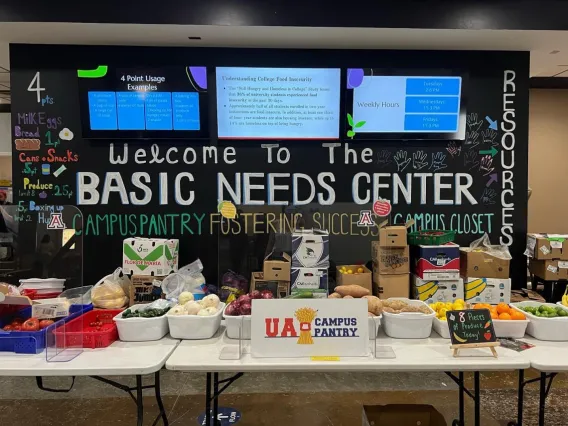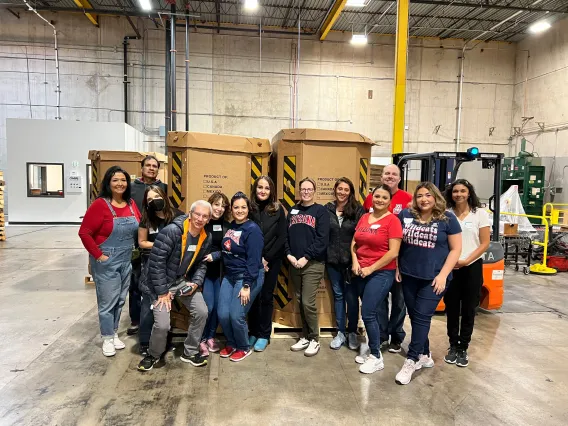Join the Fight Against Hunger!
Monday, February 17 - Monday, March 24
UA 4 Food is an annual drive to fight hunger and food insecurity throughout Southern Arizona. Students, faculty, and staff are invited to participate each spring by bringing non-perishable donations to collection sites across campus. We spend a month collecting donations and celebrate the final day of our drive by loading donations into our 40-foot-long Cat Tran for delivery to the Campus Pantry and the Community Food Bank of Southern Arizona.
How to Donate
Canned Food Donations
Look for the Community Food Bank boxes in your building, contact your department ambassador, or drive by on Monday, March 24, to drop off donations on the UA Mall on Cherry Avenue between the Flandrau Science Center and Optical Sciences.
Campus Pantry
On average, 1 in 3 college students experiences food insecurity at some point in their academic career. The Campus Pantry helps to reduce this statistic by providing supplemental groceries to students in need.
Your monetary donations help eliminate food insecurity in our Wildcat Community.
Community Food Bank
Your donation makes an immediate difference for families facing hunger.
Proceeds this year will benefit the Community Food Bank of Southern Arizona's hunger relief programs.
Help us Stuff the Cat Tran
Monday, March 24
9:00am - 4:00pm
At the end of our drive, our volunteers bring their donations to the UA Mall where we park a Cat Tran and fill it for delivery to the Campus Pantry and the Community Food Bank of Southern Arizona. Drive by to drop off your donations and take a photo with the bus! The Cat Tran will be parked on the UA Mall on Cherry Avenue between the Flandrau Science Center and Optical Sciences.
Learn more about the Campus Pantry and Community Food Bank of Southern Arizona

The UA Campus Pantry
The Mission
To reduce food insecurity in our Wildcat Community. At our distribution events, students and staff can grab important food staples at no cost. All they need is their CatCard!
The Work
The mission of the UA Campus Pantry is to alleviate hunger in the UA Wildcat community by providing food assistance to those in need.
On average, 1 in 3 college students experience food insecurity at some point in their academic career. The Campus Pantry helps to reduce this statistic by providing supplemental groceries to students in need. In addition, food insecurity looks different for all students. Sometimes it can be a lack of access to transportation, lack of financial resources, or simply not having enough nutritious foods.
The UA Campus Pantry was first chartered in the spring of 2012 with a small group of student volunteers with a passion for serving.

Community Food Bank of Southern Arizona
The Mission
The Community Food Bank of Southern Arizona responds to the root causes of hunger, and seeks to restore dignity, health, opportunity and hope to people living in poverty. Their mission is to change lives in the communities they serve by feeding the hungry today, and building a healthy, hunger-free tomorrow.
The Work
Their programs include emergency food assistance and free meals, as well as a farmers’ market, community gardens, nutrition education, culinary training, support for local growers and food systems, advocacy, and more. They partner with 400 organizations to serve five counties of Southern Arizona—over 23,000 square miles.
They are a proud member of Feeding America, a nationwide network of food banks and hunger relief organizations. In 2018, they were named Food Bank of the Year by Feeding America, in large part because of their innovative work rescuing fresh produce from the border of Mexico and redistributing it to local families and other food banks.

